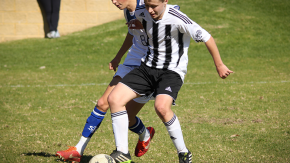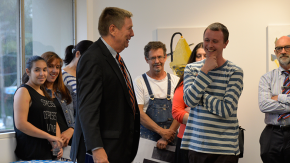Are these Testing times? Not so much…
At this time of the year, boys are coming to the end of their first term and are settled into their classes and subjects for 2015. New concepts, ideas and skills to master different challenges unique to each boy, are often drawn into a sharp focus (for boys and families) as the calendars draw closer to assessments.
Over the coming months, boys and families will notice changes to the familiar rhythms of the academic year. Next term, Years 7, 8 and 9 will no longer be sitting traditional half-yearly examinations that historically have dominated the academic landscape of the coming months. Instead, they will continue to complete rigorous programs of individual assessment tasks that will stretch into the second-half of the year. This will involve a diverse range of tasks, from test-style pieces through to research, practical and collaborative projects. Together, they will allow teachers to build an evolving sense of each student’s strengths, weaknesses and development. As the boys move closer to Term 4, they will finish the year with a formal examination period.
To reflect this change in assessment, from this year all parents in Years 7 to 9 will receive three school reports over a year, with Years 10, 11 and 12 following the familiar structures of an academic year.
| Year 7 |
Term 1 |
Term 2 |
Term 4 |
| Year 8 |
Term 2 |
Term 3 |
Term 4 |
| Year 9 |
Term 2 |
Term 3 |
Term 4 |
The new style of progress report is designed to provide detailed data on a student’s performance across each subject, both in overall terms and across individual assessments. The first of these will be distributed to families in the days prior to their parent-teacher evenings, to ensure a full and timely discussion of each boy’s learning. At the end of Semester Two following the Annual Examinations, all families will receive a full report on their son’s academic performance across the year.
“the practice and completion of test-type instruments or examinations is one of the least effective in promoting improvement in student outcomes” |
There is no doubt that this represents a change in our approach to linking learning, assessment and feedback. Our aim, however, remains the same – to ensure that all boys can achieve growing academic success by all its measures. The evolution is in how we will realise it – by moving the focus of boys and the rhythm of learning from a high-stakes task to their continuous reflection on their performance.
Professor John Hattie, in his 2009 analysis of over one hundred different factors that promote improvement in the academic achievement levels of students notes that the practice and completion of test-type instruments or examinations is one of the least effective in promoting improvement in student outcomes. The most influential strategies are those where students’ critical eyes are drawn to their own performance; self-assessment, self-evaluation and the encouraging of boys to seek and use feedback. We are excited by the effects of doing this on a continuous basis, rather than at two pressure points in a year.
A core element of the Newington Learning Framework is building the capacity of all boys to be actively reflective. We encourage our boys to ask themselves ‘what will I do differently next time?’ after they get feedback on their work from a teacher. We talk with them about bridging performance gaps, identifying specific strategies in specific subjects that will improve the quality of their work rather than focusing on marks and ranks. We want them to do this with their teachers each week, each month, and not look ahead on a calendar and wait for a mark from an examination to answer the question of ‘how am I going?’.
To this end, more important than any mark or grade, is the conversation at home and at school with boys that gets them thinking about the specifics of their efforts and helping them develop strategies that will make a difference. All assessments are different – the approaches boys will take to improving the quality of their work in a research piece will be different to focusing on the skills to complete a practical task, and different again to how they prepare for an in-class test. The new progress reports will provide indicators of how boys have performed in individual tasks and provide information to help parents start the conversations with their sons over their work in individual assessments, and to support them in looking ahead.
Our celebrations across this term of the outstanding academic achievers from 2014 reflect our pride in the impressive performances from our senior boys in both the HSC and the IB Diploma programs across the breadth of our cohort. Each result, each grade at the end of Year 12 represents a kitbag of opportunities those boys take with them when they leave, and our aim is to ensure the boys that follow them take at least as many as they did. We are excited as to how a continuous approach to assessment, more frequent reporting and our increasing ability to use data to track boys’ progress prepares them for the challenges of senior studies and helps them develop the strategies to achieve success in their own right.
References:
Hattie, J. (2009) Visible Learning. New York: Routledge






